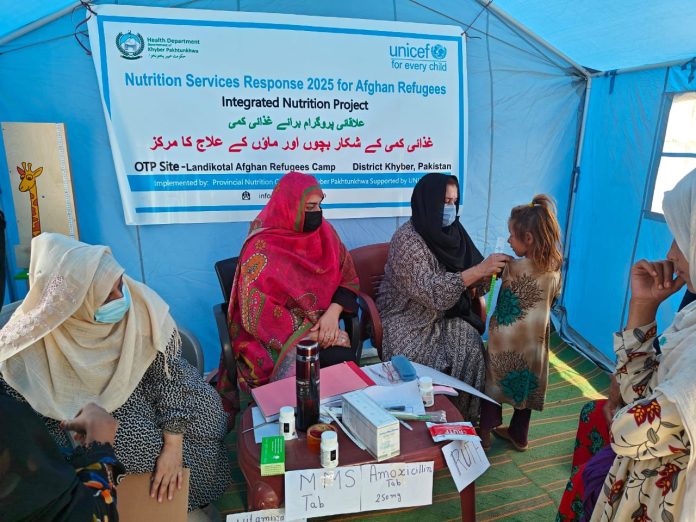By Ashrafuddin Pirzada
LANDIKOTAL: Pakistan’s repatriation of Afghan nationals has crossed the one-hundred-thousand mark since September 1, coinciding with a nutrition campaign at a holding camp in Landikotal, where the health of women and children has become a pressing concern, officials said on Saturday.
KP Chief Minister’s advisor for health, Ehtesham Ali, visited the camp a few days ago to oversee the response and later shared data on the interventions.
Health officials at the camp said that in just two days, health teams screened 276 children for malnutrition. Many were visibly undernourished after weeks of uncertainty and travel. Of those screened, 102 received micronutrient powder to correct deficiencies, while 77 were given lipid-based supplements to improve diets. They said five children who had missed routine vaccinations were referred to nearby facilities.
They said the situation among women was equally troubling. Sixty pregnant women and lactating women were screened, with more than half suffering from malnutrition. Thirty-five were placed on immediate medical support, while 39 received multiple micronutrient tablets to aid recovery. Health officials stated that the intervention was urgent but necessary, and extra supplies had been dispatched.
“I personally visited the camp to assess the situation,” the KP advisor told this correspondent on the phone. “It was only after witnessing the conditions firsthand that we identified the immediate needs.”
The remarks underline the fragile circumstances facing Afghan families who have been leaving Pakistan in large numbers since late 2023. Nearly one million Afghans have already returned under the government’s repatriation plan, most classified as undocumented migrants. Tens of thousands with Afghan Citizen Cards (ACC) or Proof of Registration (PoR) cards have also crossed back. By April this year, more than 180,000 Afghans had gone home, many through the Torkham border connecting Pakistan’s Khyber district with eastern Afghanistan.
For local authorities, the challenge was twofold: one, implementing the policy that requires the departure of undocumented foreigners, while responding to the humanitarian fallout. Camps like the one in Landikotal serve as temporary stops where urgent health and nutritional needs can be addressed before families continue their journey home.
The scale of returns has drawn international attention. Aid agencies warn that Afghanistan, already grappling with poverty, unemployment, and food shortages, was ill-prepared to absorb such large numbers. The Norwegian Refugee Council (NRC) and others have urged global support, noting that children make up more than half of those returning. A survey earlier this year suggested nearly a quarter of a million children crossed the border with little more than the clothes they wore. Without coordinated intervention, humanitarian groups fear the crisis will worsen.
Pakistan insisted it was acting within its rights, arguing that undocumented individuals cannot stay indefinitely. Earlier this year, the deadline for ACC holders was extended until August 31, after which deportations resumed. Officials maintain that health screenings, nutrition programs, and transport assistance were provided to ease the transition.
This correspondent visited the Afghan transit camp in Landikotal and spoke with Afghan citizens and officials. Staff described long lines of mothers waiting anxiously with children in their arms, hoping to secure food supplements or medicine before continuing their journey. Many had travelled hundreds of kilometres from across Pakistan and arrived weak and malnourished. The elderly often struggled to endure the long waits. Health teams worked urgently, though needs often exceeded resources.
Officials said the health department would continue to monitor the situation and expand interventions as required. They said nutrition remained the focus, as malnourished children and mothers were at heightened risk of illness. Yet, the humanitarian challenge extends well beyond Khyber. With more than a million already returned and hundreds of thousands more expected, the scale of need was outpacing local capacity. Aid workers warned that without international support, both Pakistan and Afghanistan could face worsening crises.
The scenes at the holding camp reflect the human cost of repatriation. Behind the numbers were families who had lost livelihoods and stability, now confronting an uncertain future in Afghanistan. For children, disrupted education, poor health, and limited resources could create vulnerabilities lasting years.
As the repatriation campaign continued, camps like Landikotal remained both a symbol of transition and a fragile lifeline. For Pakistani officials, they represent a commitment to meeting immediate needs. For Afghan families, they were the final stop before stepping into an uncert











